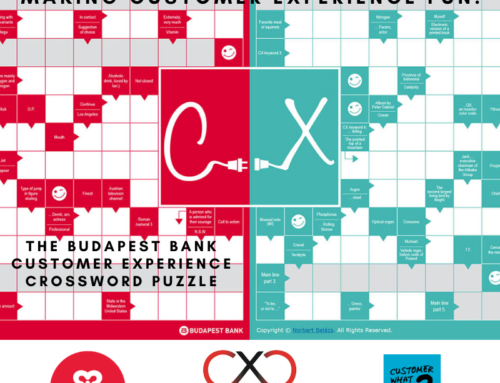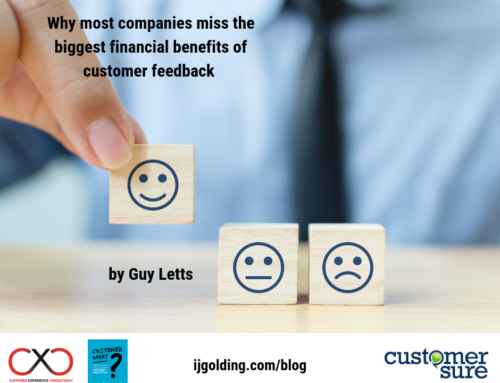
A few weeks ago, I decided to conduct some independent research. I have always been intrigued to know exactly what is most important to us as consumers, and up until now have used my professional experience, personal experiences and gut feel to assess what I thought to be the most important things. Thanks to friends, contacts and acquaintances, I am delighted to be able to put a little more ‘flesh on the bones’ to determine what is important – based on fact!
Before I reveal the results, let me give you a little background. In September 2013, I distributed a short survey to people within my networks on LinkedIn, Facebook and Twitter. The survey contained five simple questions as follows:
- What are the three most important things to you as a customer (consumer) of an organisation?
- What irritates you most as a customer (based on recent experiences)?
- Which organisations do you, or have you transacted with who deliver excellent customer experiences (in your opinion)?
- Do you ever recommend organisations you have transacted with to friends, family or acquaintances?
- Have you ever used social media (Twitter or Facebook) to interact with an organisation (when requiring customer service or help)?
In the first of a series of blog posts investigating the results, I am today exploring question number 1 – ‘what are the three most important things to you as a customer of an organisation?’. The results represent a sample of 240 people – a group of anonymous consumers to whom I shall always be very grateful. Future blog posts will look at the results of other questions from the survey.
So let’s cut to the chase!! What are the most important things to us as consumers? Although I asked respondents to list their top three things, I am actually a fan of focussing on the ‘top 5’. As such, I am excited to reveal the top five things that are important to customers (the clever reader may already have guessed from the headline image!):
Surprised? If you are surprised, I am hoping that these results may be of significance to you in some way. Whether it be to help you influence or change mind sets, or just set things straight in your own mind, having an independent source of research can be helpful. If you are not surprised, I hope you can use these results to validate what you have always thought, or add weight to what you have always said.
Analysing the results was challenging. The questions were intentionally open – leading to a wide array of responses which required interpretation. I am sure that research experts will be able to pick holes in my method – yet I am confident that the results are a very accurate reflection of the thoughts of the respondents who themselves are a representative sample of consumers. I therefore would like to walk you through the top five and provide a little more explanation.

First place and winner of the gold medal goes to what can be best described as the ‘financial’ aspect of a customers relationship with an organisation. 48% of survey respondents cited value for money, cost, price or competitiveness as one of their three most important things. I have intentionally grouped these elements together – yet it is important to understand that they are all actually different.
Many see ‘value for money’ as being something more significant than just cost or price. Consumers want to feel that the whole experience has been of value. Whether price is high or low is not as relevant as the consumer perception of value. For example, a two bedroom terrace house in London will be significantly more expensive than the same type of house in Rochdale. Despite the disparity in price or cost, they are both perceived to be value for money in their relative markets.
This does not mean price is not important. Research conducted by BT showed that 85% of consumers always shop around to get the best prices – my independent research appears to validate this. We are living in a society where disposable incomes are dropping, and price is a significant factor in purchase decision-making. The important takeaway from the findings of this research is to ensure that you consider pricing and competitiveness from a value perspective.

The silver medal goes to customer service. There is still confusion around the difference between customer service and customer experience. This recent blog post helps to clarify the situation – https://ijgolding.com/2013/10/23/customer-service-or-customer-experience-what-exactly-does-customer-experience-mean/.
Customer service is vital to us as customers – from pre sale, to post sale. 47% of survey respondents stated that customer service was one of their three most important things. The ability of organisations to help consumers at every stage of the journey is critical here, including the ability and willingness to sort out issues as they arise.
The bronze medal goes to something that I have increasingly seen become important over the last five years. As Group head of Customer Experience at Shop Direct Group, I consistently saw the inability to keep customer promises as a key driver of customer dissatisfaction. The research backs this up – 32% of respondents stated reliability (or keeping promises) as one of their top three things. We want and need to be able to trust organisations to do the things they say they will. Where promises are broken, it will have a fundamental effect on our relationships with companies.
This leads to an important question – do organisations know how reliable they are? Do they know how often they do break a promise, or not do what they say they will? Understanding your own internal capability and aligning it to customer perception can seriously aid your understanding of the elements of your customer journey that need to be improved.

Just missing out on the medals are ‘quality’ and ‘ease of doing business’. 29% of respondents cited product and/or service quality as one of their three most important things. Essentially, we need the things we are buying to be of the quality we expect. The link to price and value is vital . We still expect quality, even in a world where we expect competitive prices.
23% of respondents said that the ease of doing business with an organisation is one of their three most important things. This is of no surprise to me, as it would make my personal top three. We want websites to be easy to navigate; products to be easy to access; for it to be easy to contact an organisation. In our increasingly automated and mobile enabled world, we crave simplicity – organisations who make it difficult to interact, will ultimately lose out – as this research suggests. If I repeat this research in a years time, I would not be surprised if ‘ease’ were to move up the rankings.
So there you have it. The top five most important things to us as consumers. If you want to know what other ‘things’ missed out on the top five, drop me a line and I will fill you in! Now you know the top five, how does your own organisation measure up? Are you good value for money? Do you deliver ‘great’ customer service? Are you reliable? Are you easy to do business with? Maybe you could conduct a self assessment and let me know! Whatever you choose to do, it would be great if you would consider sharing your thoughts on the research results.
Finally, another huge thank you to all those who contributed to the research. Your time is greatly appreciated in enabling me to produce such a valuable insight into what we want as customers. The next blog post on question 2 – what irritates us most – will follow soon.








Nice blog post, potential customers need to TRUST a brand before they make a purchase.
Agreed. Trust came sixth on the list with 18% of respondents citing it on their ‘top three’ list.
Very exhaustive and points out the important ones to keep in mind while engaging our customers. Thanks for this.
Many thanks Jay – your feedback is very much appreciated
Hello
good reading!
I think though a multivariant analysis approach could give extra credability to the findings.
And also looking at some of the items there nay be connections (eg value for money and easy to do busiess, or quality)
Looking forward to part 2
kind regards Daniella
Thanks Daniella – you are correct – if I get some time over the coming weeks, I will try and do that!
Great results that leave you with a warm fuzzy feeling of “ah yes, that’s what I thought it would be”! Wonderful to see this backed by data and a good survey to refer to in discussions. Thanks a lot, Ian!!!
Ian, as usual, a very informative post. I have found many of your posts very useful to gain insight into a variety of CX perspectives. I look forward to the remaining posts on this research, especially question 2 as this is an area often overlooked by organisations, but must be a critical element of any initial strategy.
Thank you so much for your very kind feedback – it really is appreciated. I will be looking to produce the second post very soon!!
[…] revealed that ‘keeping promises’ is one of the top three most important things (https://ijgolding.com/2013/11/06/what-do-customers-really-want-the-top-five-most-important-things-rev…). Failing to deliver on promises can have very serious consequences. If you CAN do what you say, […]
Thanks Golding,
This is very helpful to my research.
If you can help with this question I’ll be glad as well. What’s the difference between a company’s value proposition and what customers really want?
Thanks
Hi Charles – the definition of a Customer Value Proposition (CVP) is:
‘A well defined and persuasive marketing statement related to a specific product or service that details the reasons why a consumer would benefit from purchasing it.’
A CVP as a result is trying to convincve a customer as to WHY they should buy something. Whilst you would hope and assume that the CVP is aligned to customer needs and wants, it could be possible that the CVP has been created with the intention of primarily determing how to makew the business more money.
[…] A few weeks ago, I decided to conduct some independent research. I wanted to know what was really important to us as customers of organisations, and was very excited to produce a blog post revealing the ‘top five’ things we want earlier this month – https://ijgolding.com/2013/11/06/what-do-customers-really-want-the-top-five-most-important-things-rev…. […]
[…] https://ijgolding.com/2013/11/06/what-do-customers-really-want-the-top-five-most-important-things-rev… […]
Reblogged this on and commented:
The top 5 most important things Customers want …. we will be doing a white paper on this in 2014, so watch this space!
[…] my independent research into ‘what customers want’ (https://ijgolding.com/2013/11/06/what-do-customers-really-want-the-top-five-most-important-things-rev…😉 last year, the top five things we want as customers […]
Most Customer Service telephone reps have NO control over many of the top items reviewed …. so, IF you are taking calls from customers the challenge IS …how do YOU provide great customer service IN SPITE OF the other deficiencies that may already be embedded in the relationship?? … hint: What can you accomplish in the first 10seconds?
Thanks for taking the time to comment Keith – what are your experiences of the ‘first 10 seconds’? Good and bad?
[…] of my independent research into ‘what customers want’, conducted in September 2013 (https://ijgolding.com/2013/11/06/what-do-customers-really-want-the-top-five-most-important-things-rev…). The top 5 things were as […]
[…] the results of my independent research into ‘what customers want’, conducted in September 2013 (https://ijgolding.com/2013/11/06/what-do-customers-really-want-the-top-five-most-important-things-rev…). The top 5 things were as […]
[…] comes a stimulant. In this world, we’re stimulated by reasons to act. Consumers must be given a reason to purchase something, and that’s where proper incentives come into play when marketing to your customers. Give them […]
[…] https://ijgolding.com/2013/11/06/what-do-customers-really-want-the-top-five-most-important-things-rev… […]
[…] and hobbies, but it should also include a section discussing possible risks. What lines should you never cross with customer? What might make them angry? What delights […]
[…] and hobbies, but it should also include a section discussing possible risks. What lines should you never cross with customer? What might make them angry? What delights […]
[…] and hobbies, but it should also include a section discussing possible risks. What lines should you never cross with customer? What might make them angry? What delights […]
[…] and hobbies, but it should also include a section discussing possible risks. What lines should you never cross with customer? What might make them angry? What delights […]
[…] and hobbies, but it should also include a section discussing possible risks. What lines should you never cross with customer? What might make them angry? What delights […]
[…] and hobbies, but it should also include a section discussing possible risks. What lines should you never cross with customer? What might make them angry? What delights […]
[…] and hobbies, but it should also include a section discussing possible risks. What lines should you never cross with customer? What might make them angry? What delights […]
[…] and hobbies, but it should also include a section discussing possible risks. What lines should you never cross with customer? What might make them angry? What delights […]
[…] and hobbies, but it should also include a section discussing possible risks. What lines should you never cross with customer? What might make them angry? What delights […]
[…] and hobbies, but it should also include a section discussing possible risks. What lines should you never cross with customer? What might make them angry? What delights […]
[…] and hobbies, but it should also include a section discussing possible risks. What lines should you never cross with customer? What might make them angry? What delights […]
[…] and hobbies, but it should also include a section discussing possible risks. What lines should you never cross with customer? What might make them angry? What delights […]
[…] and hobbies, but it should also include a section discussing possible risks. What lines should you never cross with customer? What might make them angry? What delights […]
[…] and hobbies, but it should also include a section discussing possible risks. What lines should you never cross with customer? What might make them angry? What delights […]
[…] and hobbies, but it should also include a section discussing possible risks. What lines should you never cross with customer? What might make them angry? What delights […]
[…] and hobbies, but it should also include a section discussing possible risks. What lines should you never cross with customer? What might make them angry? What delights […]
[…] and hobbies, but it should also include a section discussing possible risks. What lines should you never cross with customer? What might make them angry? What delights […]
[…] and hobbies, but it should also include a section discussing possible risks. What lines should you never cross with customer? What might make them angry? What delights […]
[…] customers, regardless of who they are, expect to pay a reasonable amount for the service they receive. The first step in achieving this is ensuring your catalogue of prices […]
[…] One of the biggest parts of running a business is learning how to please the customer. This in itself can take a long time to get right. In fact, many businesses become quite large before they perfect their customer service. However, the marketplace is becoming more and more competitive. What this means for the owner of a small business is that you can’t take any risks. Far and away the best way to ensure that your business remains competitive is to perfect the customer service side of things. The truth is, as long as you get this right, it is likely that your business can continue. But achieving this is much harder than it at first seems. First, you need to know what it is that customers really want. To help you out with that, we have put together this post on just that subject. Here is what your customer is really looking for. […]
I am a CSR in the airline biz, and the organization repeatedly tells us to use the customer’s name (even if difficult to pronounce) as it’s what they want. Yet they tell us serving them on the front-line, the name is not necessarily needed, but more of what you indicate above in terms of ranking consistent customer service delivery. What say you?
Hi Roger – in my opinion, if possible, I would use the customers name. If impossible to pronounce, then either ask the customer how to pronounce it, or use ‘sir’ or ‘madam’ instead!!!
[…] Something that every business owner in the world wants to know is what the customer really wants from a company. There has been plenty of research carried out on this subject, and a lot of articles and books written about it, and much of the received wisdom often seems to contradict itself. It almost seems as though nobody is quite sure what exactly the customer wants. The truth is, there is no one ideal customer who can respond in the way that you would imagine to any given scenario. People are individuals, and the wise business is one which accepts that and treats people with the kind of respect that individuals deserve. However, the research shows that there are some basic things which all customers will want to see from a business they are using. Let’s take a look and see what those are, so that you can better understand how to deliver for your customers in this competitive and fluctuating marketplace. […]
charming and being friendly is real asset for any business.so please think and consider before purchasing .
Good post. Give customers a great experience, and they’ll buy more, be more loyal and share their experience with friends – these are very important for me.